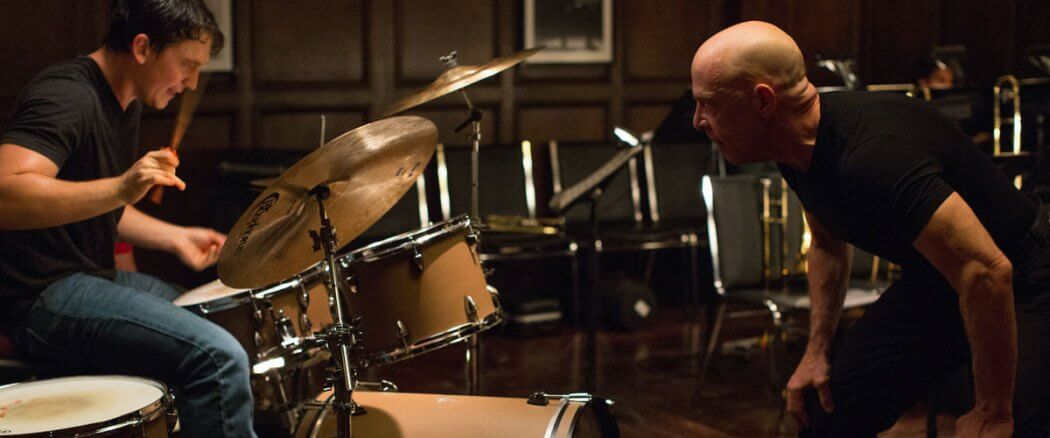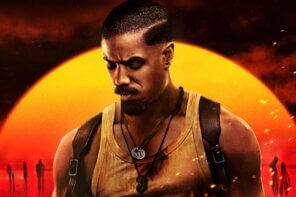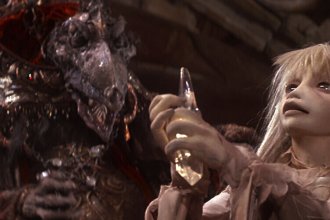What does it take to be great at something? Not just talented. Not just good. Great. That’s the question at the heart of the gripping film Whiplash.
Terrence Fletcher thinks he knows the answer. Fletcher, played to Oscar winning perfection, by J.K. Simmons, believes greatness can only be achieved by pushing people past their breaking point. According to Fletcher, the two most dangerous words in the English language are “good job.” If people are allowed to settle, they can never become great.
Fletcher is a band instructor at a prestigious conservatory in New York. His methods are unconventional. In fact, they’re merciless. He screams, belittles, and humiliates. Play one wrong note, and you’ll wish you’d never picked up the instrument. Fletcher runs his classroom entirely on fear.
Andrew Neyman is our main character, played by up-and-comer Miles Teller. Neyman is a first year drummer at the conservatory. He’s heard of Fletcher’s prestige, and longs for the opportunity to be noticed by him. One day, he gets his wish. Fletcher sees potential in Neyman and invites him to join the band. Neyman is ecstatic. His excitement doesn’t last long. On day one, Fletcher makes him cry.
That’s when we see the method behind Fletcher’s madness. Neyman doesn’t give up. He goes to his dorm room and practices all night until his fingers bleed. The next day, he plays better. Soon, he’s a different drummer entirely. Fletcher’s antics work, but do the ends justify the means?
Modern Cinema at its Finest
Whiplash is a terrific film. Writer/Director Damien Chazelle is in control of his feature from the start. We open to blackness and the simple sound of a drum stick tapping on a kit. The music is a main character in the movie. Jazz notes bob and weave throughout, in sync with the shots, to create an electrifying atmosphere. The script is lean and precise — the dialogue punchy.
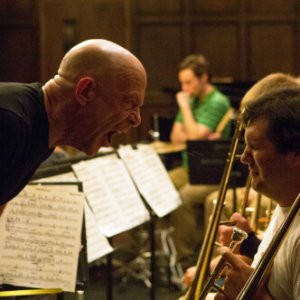 The performances are equally captivating. Miles Teller nails Neyman, capturing both his innocence and naked ambition. Neyman wants to be great, and he’ll do anything to get there. Fletcher adds fuel to the fire, awakening something menacing inside Neyman he didn’t even know existed. Special mention goes to Paul Reiser in a tender turn as Neyman’s dad, Jim. Jim becomes an important counterpoint to Fletcher. When Neyman falls, his dad is there to catch him.
The performances are equally captivating. Miles Teller nails Neyman, capturing both his innocence and naked ambition. Neyman wants to be great, and he’ll do anything to get there. Fletcher adds fuel to the fire, awakening something menacing inside Neyman he didn’t even know existed. Special mention goes to Paul Reiser in a tender turn as Neyman’s dad, Jim. Jim becomes an important counterpoint to Fletcher. When Neyman falls, his dad is there to catch him.
Then there’s J.K. Simmons. What can I say? This is a performance for the ages. Simmons displays an intensity we’ve never seen from him before. Fletcher has presence. When he walks into a room, people freeze. At the slightest twitch of his eyes or halt of his conducting hand, we flinch just like his students. He leaps off the screen.
But where Simmons really shines is in Fletcher humanity. This isn’t a two dimensional monster. We see a distinct difference in how Fletcher acts inside and outside of the classroom. The scariest villains are those who view their evil deeds as righteous. What we call abuse, Fletcher calls inspiration. He truly believes his methods are the only way to greatness.
Fear or Love?
Certainly one can follow his train of thought. There’s a disturbing trend of complacency in the education system today. Kids are rewarded for participation more than knowledge, lest we ruin their self esteem. Would we want a surgeon operating on us that got A’s for participation? On the other hand, Fletcher’s methods are dangerous. We see what happens to those who don’t have Neeman’s drive — they’re destroyed. There must be a better way.
I’m reminded of an anecdote I heard in a sermon once. The pastor was a part time football coach and he was describing the culture he sets for his team. Every practice, he asks his team three questions. First, “What can I expect of you today?” “Love!” they shout back. He responds to them, “That’s right — you’re going to love your teammates.” Then he asks, “What can you expect from your coaches today?” “Love!” they shout back. He replies, “That’s right — everything we do today is because we love you guys.” Finally, he asks them “What are you going to bring?” “110 percent!” they shout back. “That’s right,” he tells them, “that’s how you love your teammates.” Which is the better motivator — fear or love?
Jesus said, “Whoever wants to be great among you, must be your servant.” Then the creator of the universe showed us his definition of “greatness” by tying a towel around his waist and washing his disciples’ feet. The way up in the kingdom of God is always down.
Chariots of Fire
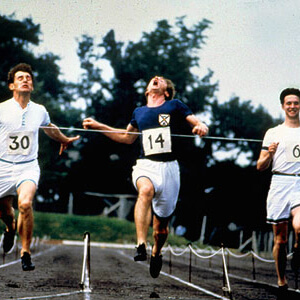 Eric Liddell was an athlete depicted in the film Chariots of Fire. Liddell was so fervent in his Christian faith that he refused to run an Olympic race he’d had his eye on for years because it happened to fall on a Sunday. He ran instead in an alternate race and won a gold medal in the summer Olympics of 1924. Liddell was famous for running with his head held high in worship to God.
Eric Liddell was an athlete depicted in the film Chariots of Fire. Liddell was so fervent in his Christian faith that he refused to run an Olympic race he’d had his eye on for years because it happened to fall on a Sunday. He ran instead in an alternate race and won a gold medal in the summer Olympics of 1924. Liddell was famous for running with his head held high in worship to God.
Liddell was a man who was great by any definition, precisely because greatness was never his goal. He lived in the freedom of the Gospel. He didn’t try to get God to like him more. He didn’t work to gain the approval of others. His spirit was at peace.
People like Liddell will accomplish great things because they’re not afraid to fail. They’ve already found their prize. Liddell offered up his gifts as worship to God, enriched the lives of those around him, and left this life whole.
Crossroads
Near the end of Whiplash, Neyman faces a crossroads. The unconditional love of his father stands on one end and the conditional love of Fletcher stands on the other. What will he choose? What will we choose?
Many will pursue the path of Fletcher in the name of art, music, sports, or religion. They’ll whip themselves every day, claw over the competition, and worship their craft. Some may even achieve greatness by worldly standards, but it will cost them everything.
At the end of their life, all of Fletcher’s disciples will stare at their accomplishments and wonder what went wrong. Where did my family go? Why can’t I feel anything? What happened to my soul?

